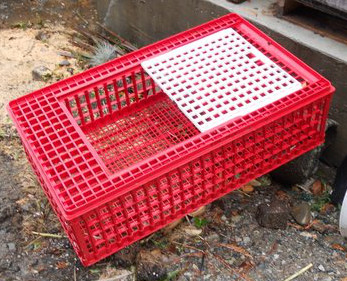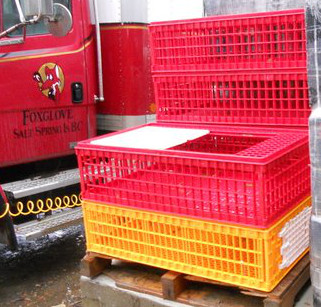When do I drop off my birds?
Birds should arrive between 8:00 and 8:15 on poultry days. Please do not arrive before the specified time as staff will be busy setting up equipment.
Safe transport of chickens
Meat chickens take many weeks to grow, and much time and effort to keep them healthy until the day they become food. Mistakes on that last day can reduce meat quality and value.
Chickens can be damaged by rough handling when picked up for loading, by being pushed into boxes with an opening that is too small, or by being crowded so that they trample and suffocate each other, or peck each other until they draw blood. All this can be prevented if transport methods are appropriate for the size of the birds.
 Plastic chicken crates with a sliding door near the middle of the top are lightweight, easy to clean, well ventilated and available for rent or purchase from Foxglove Farm and Garden Supplies. They can easily be stacked, and can help you count your chickens if you always load the same number to a crate. Many people have made their own wooden boxes that have all these features, but they are usually larger and heavier than the plastic ones and are not as easy to clean.
Plastic chicken crates with a sliding door near the middle of the top are lightweight, easy to clean, well ventilated and available for rent or purchase from Foxglove Farm and Garden Supplies. They can easily be stacked, and can help you count your chickens if you always load the same number to a crate. Many people have made their own wooden boxes that have all these features, but they are usually larger and heavier than the plastic ones and are not as easy to clean.
 Some of the chickens received at the abattoir have been in tiptop health, clean and gently handled, with every one in a large batch arriving safely and passing inspection. Others have had an uncomfortable last day, exposed to wind and rain en route and looking very bedraggled and muddy on arrival. Many cages have broken fastenings or an opening that is impossible for one person to operate. Judging by the volume of droppings in the cages it is clear that some owners forget to remove feed on the last day. The abattoir has a covered area for chicken crates but not for trailers or pickup loads, so it is up to you to provide adequate shelter on the road and for the short wait after arrival if you are not using crates. Chicken size may also affect meat quality as very big chickens are too large for the chicken cones and too small for the turkey ones, so are much more difficult to slaughter without damage. The same applies to turkeys too large for the extra large turkey cone, which is why the abattoir staff prefer turkeys that weigh less than 30 lbs live.
Some of the chickens received at the abattoir have been in tiptop health, clean and gently handled, with every one in a large batch arriving safely and passing inspection. Others have had an uncomfortable last day, exposed to wind and rain en route and looking very bedraggled and muddy on arrival. Many cages have broken fastenings or an opening that is impossible for one person to operate. Judging by the volume of droppings in the cages it is clear that some owners forget to remove feed on the last day. The abattoir has a covered area for chicken crates but not for trailers or pickup loads, so it is up to you to provide adequate shelter on the road and for the short wait after arrival if you are not using crates. Chicken size may also affect meat quality as very big chickens are too large for the chicken cones and too small for the turkey ones, so are much more difficult to slaughter without damage. The same applies to turkeys too large for the extra large turkey cone, which is why the abattoir staff prefer turkeys that weigh less than 30 lbs live.
What is pastured chicken?
Pastured chicken is raised out of doors on grass, in contrast to most commercial chicken which is raised indoors in large barns.
“Chicken tractors” are mobile pens that can be pulled onto fresh grass every day or two. They were invented to provide a clean safe environment for the young chickens, where they could live from about 4 weeks old, when they no longer need lights, until ready for harvesting. This gives them access to clean grass and weeds, while provided with feed, water, shade and predator protection.
Pen designs vary tremendously. Most will hold 50 to 70 chickens, and are moved either with a tractor or for the lighter ones by human effort only. Many designs are available on
the internet and many have been built here. Wood is most popular material, but plastic pipe, tarps, and plastic or wire netting have been used. Some have automatic watering systems.
This system provides a safe controlled environment and easy observation of the flock for the owner. It also fertilizes the ground they occupy, leaving a bright green trail where the pens used to be. This management system was made famous by Joel Salatin, who has written books about it and inspired local farmers on his recent visits to BC.
Please click on any image to see a larger version:


